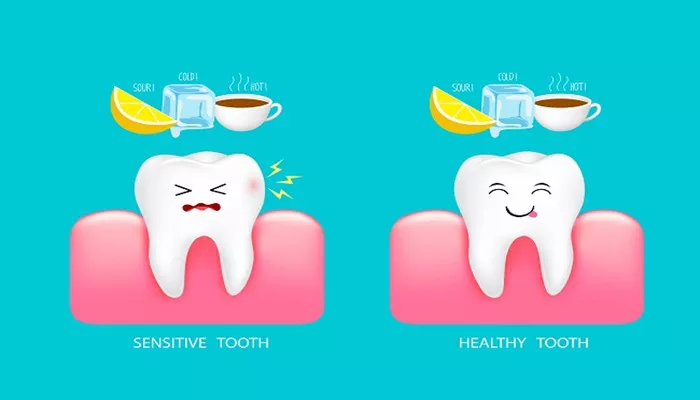Tooth sensitivity is a common problem that affects millions of people worldwide. Many people assume that sensitivity means they have a cavity, but this is not always true. A tooth can be sensitive even without a cavity. There are several other reasons why teeth may feel painful or sensitive when exposed to cold, hot, sweet, or acidic foods.
This article explains why a tooth can be sensitive without a cavity, the possible causes, and how to treat and prevent sensitivity.
What Is Tooth Sensitivity?
Tooth sensitivity occurs when the inner layers of the tooth, such as the dentin, become exposed or irritated. The dentin contains microscopic tubules that connect to the tooth’s nerves. When these tubules are exposed, external stimuli like cold drinks, hot coffee, or sweet foods can cause sharp pain or discomfort.
Can a Tooth Be Sensitive Without a Cavity?
Yes, a tooth can be sensitive even if there is no cavity. Cavities are not the only cause of tooth pain. Other factors, such as enamel erosion, gum recession, cracked teeth, or dental procedures, can also make teeth sensitive.
If you experience tooth sensitivity but do not have visible signs of a cavity, consider other possible causes.
Causes of Tooth Sensitivity Without a Cavity
Several factors can cause tooth sensitivity even when there is no decay. Below are the most common causes:
1. Enamel Erosion
Enamel is the hard outer layer of the tooth that protects the inner structures. When enamel wears down, the dentin underneath becomes exposed, leading to sensitivity.
Causes of Enamel Erosion:
- Brushing too hard or using a hard-bristled toothbrush
- Consuming acidic foods and drinks (citrus fruits, soda, vinegar)
- Acid reflux or GERD (stomach acid weakens enamel)
- Frequent teeth grinding (bruxism)
Solution:
Use a soft-bristled toothbrush and gentle brushing techniques
Reduce acidic food and drink intake
Use fluoride toothpaste to strengthen enamel
2. Gum Recession
Gum recession occurs when the gum tissue pulls away from the teeth, exposing the roots. The roots do not have enamel, making them more sensitive to temperature changes and touch.
Causes of Gum Recession:
- Poor oral hygiene and gum disease
- Aggressive brushing
- Genetics
- Smoking or tobacco use
Solution:
Maintain good oral hygiene with proper brushing and flossing
Use a desensitizing toothpaste
Visit a dentist for gum treatment if recession is severe
3. Cracked or Chipped Teeth
A small crack or chip in a tooth can expose the dentin, leading to sensitivity. Even if the crack is too small to see, it can still cause pain when eating or drinking.
Causes of Cracks in Teeth:
- Biting hard objects (ice, pens, nuts)
- Trauma or injury
- Teeth grinding (bruxism)
Solution:
- Avoid chewing on hard objects
- Wear a nightguard if you grind your teeth
- Visit a dentist to repair cracks with bonding or crowns
4. Recent Dental Procedures
Some dental treatments can cause temporary tooth sensitivity. This happens when the nerves inside the tooth become irritated.
Procedures That May Cause Sensitivity:
- Fillings
- Teeth whitening
- Crowns or veneers
- Deep cleanings or scaling and root planing
Solution:
Sensitivity from dental work usually improves within a few weeks
Use a desensitizing toothpaste
Avoid extreme hot or cold foods until the tooth heals
5. Sinus Infections
Sinus infections can cause pain in the upper teeth because the sinuses are located near the roots. When sinuses become inflamed or filled with mucus, they put pressure on the teeth, causing sensitivity.
Symptoms of Sinus-Related Tooth Pain:
- Pressure around the nose and forehead
- Congestion and difficulty breathing
- Sensitivity in multiple upper teeth
Solution:
Treat the sinus infection with decongestants or steam inhalation
Stay hydrated to thin mucus buildup
If symptoms persist, consult a doctor
6. Teeth Grinding (Bruxism)
Bruxism is a condition where people grind or clench their teeth, often during sleep. Over time, grinding wears down enamel and can cause cracks, leading to sensitivity.
Signs of Bruxism:
- Jaw pain or tightness
- Headaches, especially in the morning
- Flattened or chipped teeth
Solution:
- Wear a nightguard to prevent grinding
- Reduce stress with relaxation techniques
- Avoid caffeine before bedtime
7. Exposure to Whitening Products
Many teeth whitening products contain peroxide-based chemicals that can weaken enamel and cause temporary sensitivity.
Solution:
Use a whitening toothpaste designed for sensitive teeth
Avoid overusing whitening strips or gels
Ask your dentist about professional whitening treatments with desensitizers
How to Treat Tooth Sensitivity at Home
If you have sensitive teeth but no cavities, try these home remedies to reduce discomfort:
- Use desensitizing toothpaste (contains ingredients like potassium nitrate or stannous fluoride)
- Switch to a soft-bristled toothbrush to prevent further enamel erosion
- Limit acidic foods and drinks that weaken enamel
- Use fluoride mouthwash to strengthen teeth
- Apply a saltwater rinse to soothe irritated gums
If sensitivity persists, consult a dentist for professional treatment.
When to See A Dentist
While mild tooth sensitivity can often be managed at home, see a dentist if you experience:
- Sensitivity that lasts more than two weeks
- Severe or sharp pain
- Sensitivity in only one specific tooth
- Swollen gums or signs of infection
A dentist can identify the exact cause of sensitivity and recommend appropriate treatments such as fluoride varnishes, bonding, or gum grafts.
Conclusion
A tooth can be sensitive without a cavity due to enamel erosion, gum recession, cracks, bruxism, sinus infections, or recent dental procedures. Identifying the cause is essential for finding the right solution.
Simple changes like using a soft-bristled toothbrush, avoiding acidic foods, and using desensitizing toothpaste can help manage mild sensitivity. However, if symptoms persist, visiting a dentist is the best way to ensure long-term oral health.

